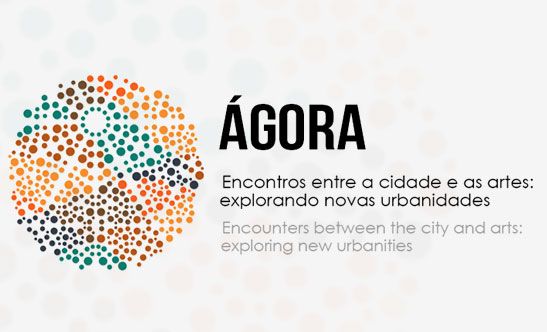Projects
ÁGORA – Encontros entre a cidade e as artes: explorando novas urbanidades
The Agora was an open space that existed in various ancient cities, reaching its greatest expression in Athens. It was a place where citizens would gather for a variety of activities, such as politics, philosophy, commerce, and the arts. The city finds in the arts a way to either uplift itself or to protest. Conversely, the arts find in the city a medium to strengthen the relationship between artists and stimulate inspiration and innovation through critical thinking and debate, much like the ancient Agora.
The decline of the 'modern' city associated with neoliberalism challenges the right to the city. In some cases, responses from the arts themselves can also threaten this right, contributing to the erosion of common sense and collective interest. The primary objective of this project is to understand how, in times of crisis, various forms of resistance and the alternatives they propose take place in the city through the arts and artists. How can these transformations, prioritizing social justice and creativity, promote new urban experiences?
Thus, it is crucial to understand to what extent artistic dynamics are connected to the tensions between market forces, political powers, and the rejection of the neoliberal model, particularly in the metropolis of Lisbon.
Objectives
The specific objectives of the project focus on three key topics, developed in the research plan and methods: understanding the transformations of cities, particularly the increase of a public space that is increasingly regulated, controlled, and surveilled, and the resulting resistance and alternatives to change.
The project aims to contribute to:
- Theoretical and methodological development in the mentioned fields, based on a vision of critical science;
- The analysis of the impacts of artistic activities on the creation of new urbanities;
- The creation of maps and infographics presenting the results through an atlas, a guide, and an exhibition (photography, video, and augmented reality);
- Two software applications, one interactive platform about artists and the arts, and another ‘augmented reality’ application related to urban art routes, including literary tours;
- The development of a benchmarking exercise on the capitals of European countries particularly affected by the crisis (Lisbon, Athens, Madrid, and Dublin);
- The development of urban policy guidelines.
The adopted methodology combines both quantitative and qualitative methods. The former includes the analysis of statistical data provided by various Portuguese and European institutions on the relationship between the city and the arts, particularly in terms of production and consumption. The qualitative methods involve the combination of several methodological tools:
- Questionnaires and interviews with artists and cultural agents promoting art in the city;
- Analysis of artists' curricula based on the vast range of information available online;
- Analysis and mapping of literary works on the Lisbon metropolis;
- Development of case studies on "artistic-cultural scenes" in the Lisbon Metropolitan Area undergoing significant transformation. In one of the case studies, an Urban Living Lab will be created, where action research based on co-produced knowledge (in collaboration with local agents) will be developed to produce practical and evaluable results.
Research Team
- Isabel André (coordinator)
- Ana Moutinho
- Ana Estevens
- Agustín Cócola Gant
- Aquilino Machado
- Daniel Paiva
- Eduardo Brito Henriques
- João Sarmento
- Leandro Gabriel
- André Carmo
- Mariana Gaspar
- Miguel Santo
- Financiamento Funding
Fundação para a Ciência e Tecnologia (FCT): 154 949 EUR - Referência do Projeto Project Reference
PTDC/ATP-GEO/3208/2014], F



